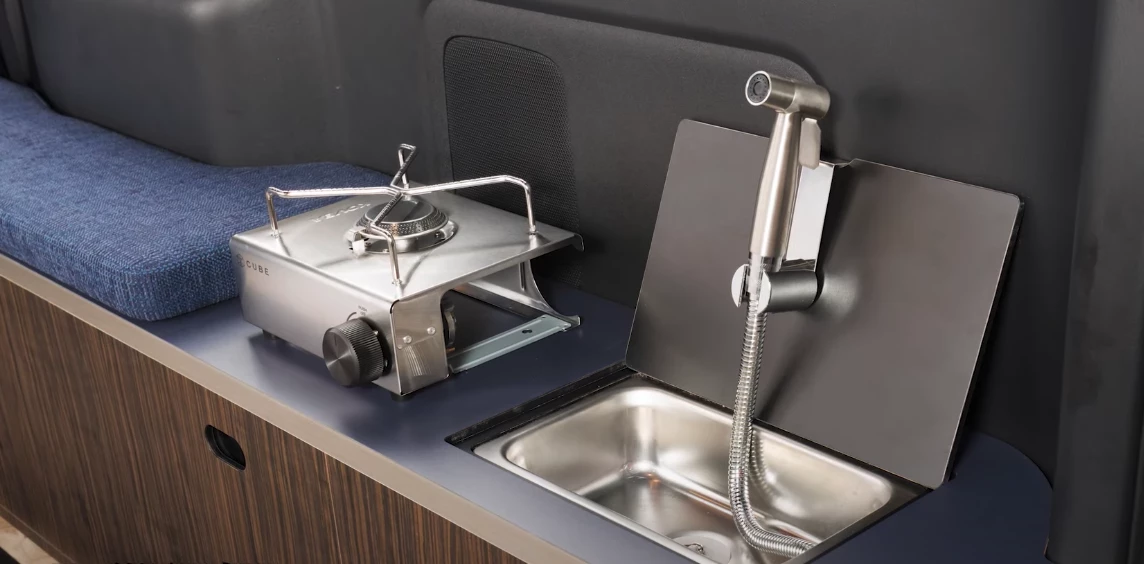Many small camper vans are built to double as everyday three-row MPVs complete with seven or eight seats. Typically such camper vans require removing or installing seats and other equipment when switching between camping and daily driving modes. A new Toyota HiAce camper van from Japanese aftermarket parts and conversion shop UI Vehicle makes it even easier, switching modes in seconds without the need to remove or install a single piece of equipment. It's both a full-time camper van and a full-time passenger van, with very little compromise.
UI's seven-seat HiAce camper isn't a brand-new design. The company explains that it was once a popular option in its lineup but had to be discontinued in the mid 2010's due to an issue with Japanese vehicle registration regulations. Those regulations were modified earlier this year, opening up the path for the return of the HiAce seven-seater. The new van is an adaptation of the company's five-seat Freestyle camping package, and we'll call it the Freestyle 7. UI held a premiere of the newly revived model this past weekend at the 2022 Fukuoka Camping Car Show.
The Toyota HiAce underpinning the Freestyle 7 is downright roomy compared to the tiny sub-4-m (13-ft) kei car micro-campers we're used to seeing come out of Japan's domestic market. Still, at just 470 cm (185 in) long, it's quite tiny by Western camper van standards, a proper mini-camper that lands between a standard VW Caddy and a VW Caddy Maxi in length.

In MPV mode, the Freestyle looks like an unassuming small passenger van. It has three rows with two seats in the rearmost row, three seats in the middle row and two cab seats up front. It's ready to carry the family around to work, school, sports, band practice and whatever else is inked on the weekly schedule.
Mini-camper vans tend to stick with a single rear bench because once you put a middle row in, you end up devouring space for a kitchen block and dining lounge. But UI's bench is quite different from the average. Its seat cushion flips up to work as a rear-facing seat back while the front-facing back folds down to double as the cushion. In a few seconds, the passenger bench becomes a rear-facing camping bench.

The removable table attaches between the flipped second-row and third-row benches to complete a five-seat dining lounge. In this way, UI does away with the need for swivel cab seats, leaving the front seats available as overflow seating for the two unlucky campers who don't secure a seat at the main dining table.
Both rear benches are mounted to floor rails and can slide into various positions to improve comfort, on the ride and at camp. At night, the seats fold flat and team with a set of rear cushions to create a huge bed that spreads wall to wall and stretches a full 2.9 m (9.5 feet) from the tailgate to the B-pillars.

A seven-seat minivan with sleep- and eat-in capabilities would be handy enough, but UI goes the extra step in giving it a more complete set of camping equipment. The consoles that flank the two-seat third row do more than just hold cushions to extend the bed width. They cover over the wheel wells up front and make room for compact micro-camping amenities toward the back, just inside the tailgate. The driver's side console houses a slim sink fed by a pump submerged in the 10-L water tank, and UI shows a small single-burner portable camping stove standing next to it as a light, versatile cooking solution.

The passenger side console is used to house the optional leisure battery for at-camp power. It can run things like the expanded overhead lighting package, USB, 12-V and 240-V outlets, and an electric cooler.
It might look like the three rows of seating interfere with the Freestyle 7's ability to go full cargo van, but the third-row bench folds in half and both rear benches slide forward to clear out a load area. So owners get a cargo van large enough to haul a bicycle, scooter or plenty of luggage in seconds, without having to remove any seating or components.

The Freestyle 7 joins the nine-seat Southvan Allrounder as two of the most versatile little vans we've ever seen, each with its own distinct layout. The Freestyle 7 seems perfect for any active family. It can carry up to seven people around town all week, easily accommodate groceries and other packages, carry five people plus loads of sports gear or luggage on the weekend, and serve as a quick-converting two-person+ camper anytime it's needed ... even if when the overnight stay wasn't part of the original trip plan. Throw in a camping tent, and it can seat and sleep the whole family.
The UI Freestyle 7 comes in both standard- and wide-body variants with gas and diesel powertrain options. Pricing starts at ¥4.85 million (approx. US$34,625) for the gas 2WD and ¥5.74 million (UA$39,050) for the gas 4WD. In addition to the interior conversion, UI adds in suspension and running gear upgrades for a smoother ride. Additional options include a small camping heater, a 400-W inverter, black-out curtains, and overhead rear speakers meant to improve vehicle audio muffled by the cushions covering part of the rear sidewall speakers.
Source: UI Vehicle (Japanese)














